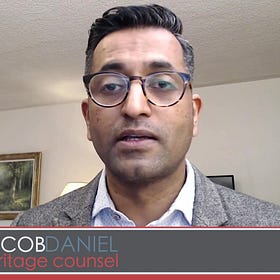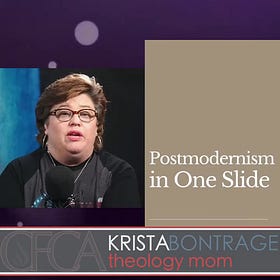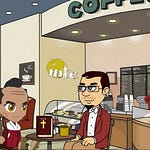This is the welcome address by Dr. J.R. Miller to the 2021 conference on Critical Race Theory and Christianity that was hosted by the Center for Cultural Apologetics. The conference talks are divided along four big themes:
Session #1: Critical Theory & Human Sacredness
Session #2: Critical Theory and Reading Scripture
Session #3: Critical Theory and the Gospel
Session #4: Critical Theory and Biblical Community
Each session features 3 speakers and a Q&A session aimed at equipping Christians to critically evaluate CRT, and other similar social constructs, and to discern their compatibility with the Gospel.
Each of the 16 videos from our conference speakers is now part of a small group curriculum available to all More Than Cake subatack subscribers. As a subscriber, you are free to use this content in your church, college group, or small group to foster meaningful discussions on the issue of race and reconciliation.
Questions to Get You Started
Answer the following questions in 2-3 sentences.
What is the central belief of critical theory and how does it impact an individual's faith?
How does critical theory contribute to racial division?
How does Dr. Miller characterize the conflict between critical race theory and the gospel?
What specific elements of Christian faith can help Christians counter the influence of critical theory?
What is the potential danger of focusing on identity labels as defined by CRT?
What biblical concept is central to overcoming division and promoting unity?
What role does the Holy Spirit play in addressing racism and division?
Session #1: Critical Theory & Human Sacredness
Cancel Culture: The Antithesis of Christianity
Dr. Jacob Daniels argues that cancel culture, a phenomenon where individuals are ostracized for past actions or statements, represents a significant threat to Western civilization. Daniels claims that this trend is the result of a confluence of postmodern ideas, such as critical theory and identity politics, which have eroded traditional Western values like individual freedom and a presumption of innocence. Cancel culture reflects a shift from a guilt and innocence framework to an honor and shame framework, which is more common in collectivist societies, and he argues that this shift is ultimately detrimental to individual dignity and freedom. Ultimately, Daniels encourages listeners to embrace a dignity culture based on Christian principles, where individuals are valued for their inherent worth rather than their adherence to societal pressures or ideologies.
Do Black Lives Matter?
Leroy Hill argues against the application of critical race theory (CRT) to the question of whether black lives matter. Hill contends that CRT cannot confer ultimate meaning or value on black lives because it denies the existence of an objective standard, namely God. Conversely, Christianity affirms the inherent sacredness of all human life, including black lives, because all people are created in the image of God. He further argues that while CRT proponents can claim temporal meaning and value, ultimately, without God, existence is meaningless and life is absurd.
Critical Race Theory, Segregation and the Sacred Image of God
Dr. Miller argues that, while critical race theory (CRT) acknowledges the historical evils of racism, its reliance on racial categories and prescription of segregated spaces ultimately mirrors the problematic logic of past segregationist movements. The author draws parallels between the segregationist policies of the early 20th century and the growing advocacy for racial segregation by some CRT proponents. Ultimately, Dr. Miller suggests that the solution to racial injustice lies in embracing the biblical truth that all humans are created in the image of God, regardless of race, and rejecting the divisive social construct of race itself.
Q&A Session 1: CRT & Human Sacredness
This is the session 1 Q&A featuring Jacob Daniel, Leroy Hill, and Joe Miller from our 2021 CFCA conference on Critical Race Theory and Christianity. The participants define CRT, explore its implications for how people view the world, and offer guidance on how Christians should approach conversations about race and racism. The conversation highlights concerns about CRT's emphasis on racial identity, its tendency to create division, and its potential to undermine a foundation of human sacredness. Ultimately, the speakers emphasize the importance of a Christian worldview in navigating these complex discussions and advocate for a posture of love, compassion, and truthfulness.
Session #2: Critical Theory and Reading Scripture
The Sufficiency of Scripture Versus the Utility of Critical Race Theory
Leroy Hill argues that the Bible is sufficient to address racial inequities and that critical race theory (CRT) is ultimately harmful, despite its potential usefulness as an analytical tool. He contends that CRT, as a feature of critical theory, seeks to dismantle existing systems and, in doing so, undermines Christian values and institutions. Hill presents a biblical framework for understanding creation, the fall, and redemption, asserting that God's plan for redemption and reconciliation through Jesus Christ provides a more effective way to address racism than CRT's focus on systemic analysis. He emphasizes the sufficiency of scripture in guiding Christians towards righteous actions and argues that embracing the Bible as the ultimate source of truth and guidance will equip believers to live in love and combat racism effectively.
Avoiding Woke Hermeneutics
Krista Bontrager, a theologian and Christian apologist, argues against what she calls "woke hermeneutics," a method of interpreting the Bible through the lens of social analysis. Bontrager claims this approach confuses biblical interpretation with application and incorrectly asserts that truth depends on social position. She contrasts woke hermeneutics with a classical model of biblical interpretation, arguing that it is possible to recover the author's intent and that there is an objective meaning to the text. Bontrager concludes that historic Christianity is not inherently white or Western, and there is a shared tradition of interpretation regardless of social position.
My Truth is Your Truth: misreading Scripture through the Lens of CRT
Dr Joseph R. Miller argues that CRT’s four interpretive lenses, which focus on the experiences of oppressed groups, distort the Bible’s meaning, creating a subjective interpretation that ultimately undermines the text’s universal truth and authority. He argues that these lenses lead to a rejection of traditional Christian doctrine, a denial of the writers’ and God’s personhood, and a reliance on group consensus rather than objective meaning. Miller advocates for a different approach, recognizing the Bible’s shared truth across cultures and identities, encouraging respect for the writers’ humanity, upholding the sacred worth of every reader, and ultimately submitting to God’s authority.
Q&A Session 2: Critical Race Theory & Reading Scripture
This is the session 2 Q&A featuring Leroy Hill, Krista Bontrager, and Joe Miller from our 2021 CFCA conference on Critical Race Theory and Christianity. The speakers address the definition of Gnosticism and how it compares to CRT, as well as the role of the Holy Spirit in understanding scripture. They also discuss the relationship between scripture and general revelation, arguing that the Bible provides a comprehensive framework for living a holy life but does not offer specific guidance on all aspects of life. The session ends with a call to action, encouraging listeners to engage in meaningful conversations about these issues in their own communities.
Session #3: Critical Theory and the Gospel
Sin: The Gospel & Critical Theory
Monique Dusson, founder of the Center for Biblical Unity, argues that critical race theory (CRT) condones sin because it promotes the idea that treating some groups unequally based on skin color or socioeconomic status can be justified if it advances underprivileged groups. Dusson believes that CRT ignores the fundamental Christian concept of sin as a heart issue and instead focuses on systems and structures, ultimately promoting a secular worldview that undermines the authority of God's Word and the truth of the Gospel. She emphasizes that only through a transformed heart, informed by the law and the gospel, can true justice and reconciliation be achieved.
Critical Race Theory: A Relational Imposter
In this talk, Dr. Ward Crocker against the compatibility of critical race theory and the gospel. He argues that critical race theory, while seeking to address real social issues like racism, ultimately promotes division and racial tension through its focus on collective guilt and the authority of lived experience. Dr. Crocker suggests that the gospel of Jesus Christ offers a superior alternative, emphasizing forgiveness, love, and grace as essential components of true reconciliation.
Ambassadors of Reconciliation: The Gospel and Critical Race Theory
This talk features Kevin McGary, founder of the organization Every Black Life Matters, discussing the concept of biblical reconciliation as a way to counter the divisive effects of Critical Race Theory and secular reconciliation efforts. McGary argues that Christians should focus on reconciliation through Christ rather than on addressing historical racial injustices, as he believes this leads to sin and pride. McGary advocates for a return to the Bible as the foundation for resolving social issues, emphasizing that true reconciliation comes from embracing the unity Christ provided.
Q&A Session 3: Critical Race Theory & The Gospel
This is the session 3 Q&A Monique Duson, Kevin McGary, and Ward Crocker from our 2021 CFCA conference on Critical Race Theory and Christianity. This video is now part of a small group curriculum you are free to use in your church or campus small group to foster meaningful discussions on the issue of race and reconciliation.
Session #4: Critical Theory and Biblical Community
Social Justice vs. Biblical Justice
This excerpt is a conversation about biblical justice versus social justice. The speakers, Monique Desson and Krista Bontrager, explore how these two concepts are often seen as opposing forces and discuss the differences in their approaches to achieving justice. They highlight the cultural consensus and moral relativity that often define social justice, arguing that biblical justice is rooted in God's unchanging character and moral law. They conclude by emphasizing the importance of understanding God's laws and the gospel in discerning how to live a just life.
Critical Race Theory: A Curse on the Course of the Church
Kevin McGarry, founder of Every Black Life Matters, argues that critical race theory (CRT) is a demonic doctrine that is dividing the church and impeding the pathway to Jesus. He asserts that CRT is rooted in Marxism, which he traces back to virulent atheism. McGarry criticizes CRT's accusatory nature, which he believes casts white people as irredeemable and racist. He further contends that CRT is a cursebecause it infuses the gospel with divisive and inaccurate ideas. McGarry advocates for a return to biblically-based discipleship as a solution to the problems created by CRT.
Church as the Moral Gatekeeper in an Age of Schisms
This talk is the second of two given by Jacob Daniel who argues that Western culture has entered a period of moral decline due to the rejection of God and objective truth. Daniel contends that this has led to a societal crisis characterized by a lack of lasting commitments and a reliance on subjective preferences, creating a culture of cynicism and spiritual nihilism. He emphasizes the need for Christians to engage in evangelism not just of individuals but also of culture, by upholding God's truth and demonstrating the transformative power of the gospel. Daniel concludes by encouraging listeners to be bold witnesses for Christ in a world that has abandoned the true source of meaning and purpose.
Q&A Session 4: Critical Race Theory & Biblical Community
This is the session 4 Q&A featuring Leroy Hill, Krista Bontrager, Joe Miller, Monique Duson, Jacob Daniel, and Kevin McGary from our 2021 CFCA conference on Critical Race Theory and Christianity. There is also a special appearance from our brother Roland Slade. This video is now part of a small group curriculum you are free to use in your church or campus small group to foster meaningful discussions on the issue of race and reconciliation.
What Next?
If you’re interested in more information about Critical Race Theory and how it's incompatible with the Christian worldview, check out this event below.
4 Facets of Critical Race Theory
On November 12, 2021 Dr. Joseph R. Miller presented this talk at the Mars Hill forum of Northeast Calvary Chapel in California. Dr. Miller unpacked the philosophical underpinnings of Critical Race Theory (CRT) by analyzing its impact on contemporary social and political discourse. He argues that CRT, while often presented as a tool for combating racism, ultimately promotes a worldview that is fundamentally incompatible with Christian values, relying on a nihilistic outlook and an emphasis on group identity rather than individual worth. Dr. Miller highlights the core tenets of CRT, including its rejection of objective truth and its tendency to view all social interactions as power struggles, ultimately leading to a worldview where conflict and division are inevitable. He contends that the Bible offers a counter-narrative to CRT, emphasizing individual worth and unity in Christ, offering a solution to the problem of racism through love and reconciliation.































Share this post